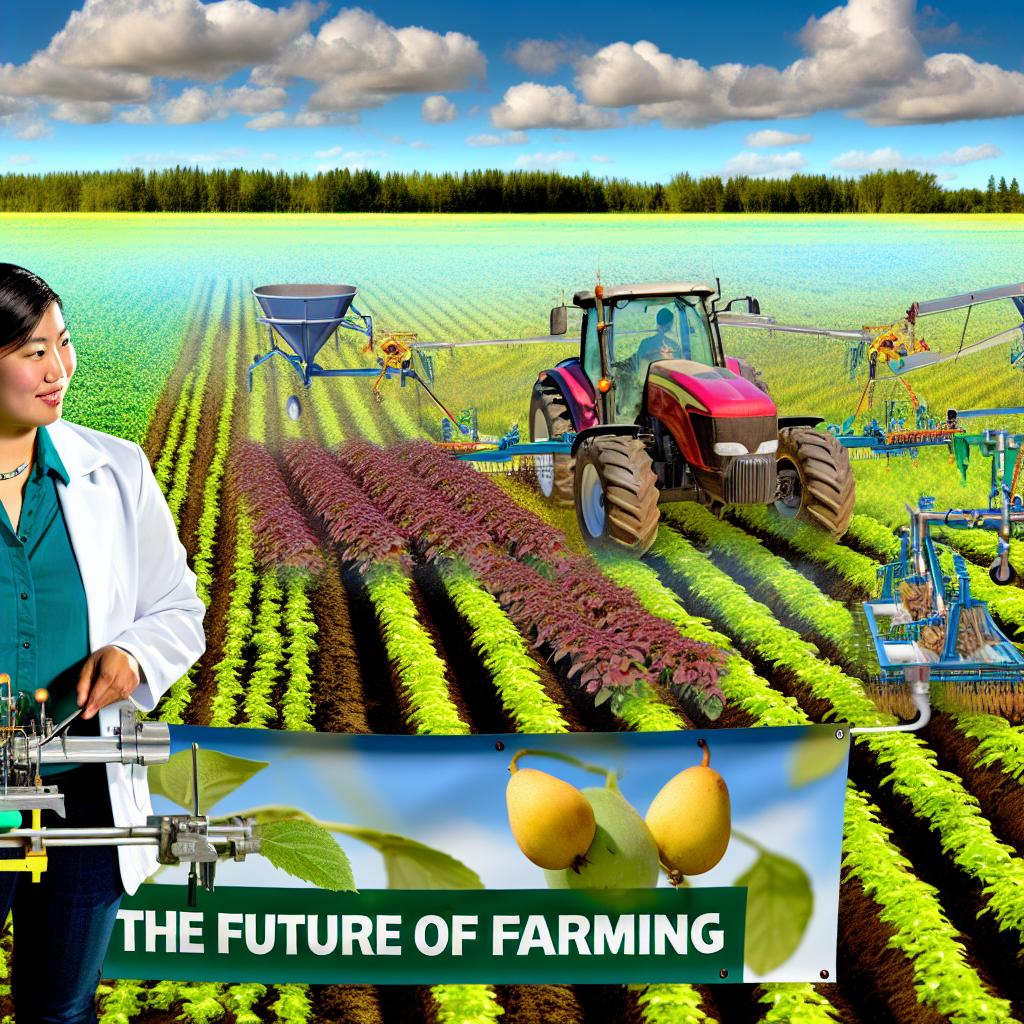Introduction
AgriTech plays a crucial role in shaping modern agriculture.
Innovations in this field enhance productivity and sustainability.
Farmers now utilize drones, sensor technology, and data analytics to optimize crop yields.
This shift significantly alters farming landscapes and practices.
In Canada, farming careers have undergone substantial evolution.
Historically rooted in traditional practices, the industry now embraces advanced technologies.
Many young professionals are increasingly drawn to careers in AgriTech.
They find opportunities in software development, precision farming, and agricultural engineering.
Technological advancements revolutionize farming techniques and practices.
Smart equipment allows for increased efficiency in planting, harvesting, and managing resources.
Automation reduces labor costs while improving accuracy in various operations.
Subsequently, producers can monitor crops and livestock in real-time.
This enables data-driven decisions.
Moreover, precision agriculture techniques drastically minimize waste and enhance resource management.
By using GPS and satellite imagery, farmers can target specific areas needing attention.
This level of precision maximizes output and sustainability, aligning with global environmental goals.
Entrepreneurs leveraging AgriTech solutions drive economic growth.
Startups in Canada develop innovative products catering to specific agricultural challenges.
These ventures create new jobs and encourage further investment in the sector.
Furthermore, educational institutions emphasize AgriTech in their curricula.
Universities offer specialized programs that blend agriculture with technology.
Graduates emerge equipped with critical skills to navigate the industry’s future demands.
The synergy between agriculture and technology fosters a dynamic future.
As AgriTech continues to advance, it reshapes career paths and opportunities for farmers across Canada.
With each innovation, the industry can meet the challenges of feeding a growing population sustainably.
Unlock Your Career Potential
Visualize a clear path to success with our tailored Career Consulting service. Personalized insights in just 1-3 days.
Get StartedDefining AgriTech
AgriTech, short for agricultural technology, represents cutting-edge innovations that enhance farming practices.
This field encompasses an array of technologies aimed at revolutionizing agriculture.
Farmers increasingly leverage these advancements to boost productivity and sustainability.
What AgriTech Entails
At its core, AgriTech involves applying technology to improve agricultural efficiency.
This includes optimizing crop yields, managing resources, and minimizing environmental impact.
Innovations in AgriTech address various challenges faced by farmers.
- Enhancing Crop Yields: Advanced techniques allow farmers to grow more crops per acre.
- Resource Management: Technologies enable smarter resource allocation, reducing waste.
- Environmental Sustainability: AgriTech solutions prioritize eco-friendly practices.
Overview of Various Technologies Utilized
A wide range of technologies fall under the umbrella of AgriTech.
These powerful tools provide farmers with crucial insights and capabilities.
Here’s a breakdown of some prevalent technologies:
- Internet of Things (IoT): IoT devices connect farming equipment and monitor conditions in real-time.
- Artificial Intelligence (AI): Algorithms analyze data, helping farmers make informed decisions.
- Drones: Drones offer aerial imaging, crop monitoring, and even targeted pesticide application.
- Precision Farming: Farmers use GPS technology for precise planting and resource management.
- Robotics: Autonomous machines undertake tasks like planting, weeding, and harvesting.
Emphasis on Sustainability and Efficiency
AgriTech solutions increasingly focus on sustainability and efficiency.
As climate change poses challenges to agriculture, these technologies play a vital role in minimizing adverse effects.
Implementing these innovations can enhance both environmental stewardship and economic viability.
- Water Conservation: Smart irrigation systems optimize water usage, preventing overconsumption.
- Soil Health Monitoring: Sensors help assess soil conditions, supporting practices that maintain fertility.
- Carbon Footprint Reduction: Technologies aid in lowering greenhouse gas emissions in farming operations.
By integrating AgriTech into their daily routines, farmers in Canada can tackle many challenges.
These innovations are transforming careers in agriculture and paving the way for a more sustainable future.
The Current State of Farming Careers in Canada
The farming landscape in Canada has undergone significant changes over the past few decades.
Traditional farming roles no longer operate in isolation.
They now exist within a broader industry that embraces technology.
These changes have transformed what it means to work in agriculture.
The evolution of farming careers is noteworthy.
Overview of Traditional Farming Roles and Their Evolution
Farming in Canada traditionally encompassed various roles.
Most individuals relied on manual labor to cultivate crops and manage livestock.
Gradually, mechanization introduced tractors and harvesters, changing job requirements and responsibilities.
- Farm Laborers: Initially focused on manual tasks such as sowing, weeding, and harvesting.
- Farm Managers: Responsible for day-to-day operations, managing budgets and staff.
- Agronomists: Specialized in soil health and crop management, they consulted with farmers for better yields.
Today, these roles have evolved significantly.
With technology transforming practices, new roles have emerged.
Farmers now utilize drones, sensors, and software to optimize productivity.
Consequently, traditional roles have adapted to accommodate this evolution.
Discussion on Labor Shortages
Despite technological advancements, Canada’s agriculture sector faces labor shortages.
Aging farmers exit the workforce without younger employees stepping in.
This trend creates a significant gap in skilled labor across the nation.
- Workforce Demographics: A considerable percentage of farmers are nearing retirement age.
- Attractiveness of Careers: Agricultural careers often struggle to attract young talent.
- Seasonal Employment: Many agricultural jobs are seasonal, leading to unstable employment.
As the demand for food production increases, this shortage becomes urgent.
Farmers struggle to maintain operational efficiency without adequate staffing.
Therefore, there’s a growing need for skilled workers who can adapt to modern agricultural practices.
The Shift Towards Technologically Skilled Workers
To address labor shortages, the industry increasingly seeks technologically savvy professionals.
Advanced technologies require specific skill sets to operate effectively.
This shift has highlighted the importance of education and training in agriculture.
- Precision Agriculture Specialists: These professionals use data analytics to optimize farming practices.
- Agri-Tech Engineers: They design and implement technological solutions for modern farming challenges.
- Data Analysts: Responsible for interpreting data to enhance productivity and profitability.
The demand for these roles continues to grow as farmers adopt new technologies.
Workers need not only agricultural knowledge but also expertise in tech applications.
This shift holds immense potential for the future of farming careers in Canada.
Statistics on Farming Career Growth
The evolution of agriculture has sparked measurable growth in farming careers.
Various reports highlight the increasing demand for tech-savvy professionals.
According to recent data, specific trends emerge in agricultural employment:
- Projected Growth: The agriculture sector is expected to grow by 10% over the next decade.
- Technology Adoption: Over 60% of farms now utilize some form of agricultural technology.
- Job Vacancies: An estimated 30% of agricultural roles remain unfilled due to skill mismatches.
These statistics illustrate the crucial role technology plays in shaping the future of farming careers.
The industry needs a workforce ready to embrace and innovate with new technologies.
Investment in Education and Training Programs
To meet the growing demand for tech-savvy professionals, investment in education and training is vital.
Colleges and universities are updating their agricultural programs to include technology components.
As a result, more students are enrolling in agriculture-related fields.
- Partnerships with Tech Companies: Educational institutions collaborate with AgriTech firms to ensure relevant curricula.
- Hands-On Training: Programs now emphasize real-world experience through internships and co-ops.
- Online Learning: Increased availability of online courses caters to a broad audience.
Such initiatives help bridge the skill gap in the agricultural workforce.
They equip future workers with the necessary technology skills to thrive in modern farming careers.
Implications for the Future of Farming Careers
The agricultural landscape in Canada is constantly changing.
Traditional farming roles have evolved to meet technological advancements.
Labor shortages and a lack of skilled workers have prompted a shift towards technology-driven positions.
As the demand for tech-savvy professionals rises, education and training programs play a crucial role.
Investing in the future of farming careers will ensure sustainability and productivity in Canadian agriculture.
Uncover the Details: How Climate Change Is Transforming Careers in Canada’s Agricultural Sector
How AgriTech is Creating New Job Opportunities
The advent of AgriTech has transformed the agricultural landscape in Canada.
This transformation has opened numerous job opportunities.
Emerging roles in AgriTech require diverse skill sets.
Traditional agricultural practices must adapt to meet modern demands.
Here, we explore the various job roles emerging within this dynamic field.
Breakdown of Emerging Roles in AgriTech
- Data Analysts: Data analysts play a crucial role in AgriTech. They analyze data from various sources. This data helps farmers make informed decisions. Their insights can improve crop yields and reduce waste.
- Agronomists: Agronomists specialize in crop and soil science. They apply agricultural principles to enhance productivity. Their expertise aids in developing sustainable farming practices.
- Technology Support Specialists: Tech support specialists help farmers use new technologies. They troubleshoot issues related to AgriTech tools and platforms. Effective support ensures smooth operation and increases user satisfaction.
- Precision Agriculture Specialists: These specialists focus on optimizing field-level management. They use technology to assess and manage variability in crops. Their work leads to more efficient resource use.
- Drone Operators: Drones are becoming essential in modern agriculture. Operators collect aerial data for analysis. Their work helps in monitoring crop health and optimizing irrigation.
- Supply Chain Managers: These professionals ensure the efficient distribution of agricultural products. They focus on maximizing efficiency and reducing costs. Their role is vital for connecting farmers with markets.
- Agritech Business Consultants: Consultants provide expertise in AgriTech business ventures. They guide startups and established companies alike. Their insights help organizations navigate the evolving market landscape.
Interdisciplinary Opportunities
The rise of AgriTech encourages interdisciplinary collaborations.
Experts from various fields combine their skills with agriculture.
This synergy fosters innovation and creativity across sectors.
Professionals from IT, engineering, and finance find exciting roles in AgriTech.
- IT Professionals: Software developers create applications that assist farmers. They design platforms that analyze data and improve productivity. Their work enhances the way farmers interact with technology.
- Engineers: Engineers develop machinery suited for modern farming. They design automated equipment that streamlines operations. Mechanical, electrical, and agricultural engineers play vital roles.
- Financial Analysts: Financial experts assess investment opportunities in AgriTech. They analyze market trends and provide strategic advice. Their knowledge helps secure funding for innovative projects.
- Bioinformatics Specialists: These professionals analyze genetic data to improve crop resilience. Their work enhances food security and sustainability. They combine biology, data science, and technology for efficient solutions.
Examples of AgriTech Start-ups and Companies
Numerous AgriTech start-ups and companies have emerged in Canada.
These organizations focus on creating jobs while promoting innovation.
Their efforts illustrate the potential of AgriTech to shape the future of farming careers.
- Farmers Edge: This company provides data-driven solutions for farmers. They offer precision agriculture tools and analytics software. Their innovation boosts productivity while reducing costs.
- AgFunder: A leading AgriTech investment platform, AgFunder connects investors to startups. They facilitate funding for new businesses in the sector. Their efforts foster growth and job creation.
- Invenia: This company harnesses artificial intelligence for agricultural optimization. They develop algorithms to predict weather patterns. Their work supports smarter farming practices.
- Smart Agriculture: Smart Agriculture focuses on IoT solutions for farmers. They provide connected devices that monitor crops and livestock. Their technology enhances efficiency and profitability.
These companies illustrate how AgriTech is actively creating jobs.
As more innovations emerge, professionals from various backgrounds will find roles in this sector.
The growing demand for skilled workers highlights the transformative power of AgriTech.
Uncover the Details: Why Sustainable Farming Is Key to Canada’s Economic Growth
Skills Required for Successful Careers in AgriTech
To thrive in the booming AgriTech sector, individuals must develop a diverse skill set.
Success hinges not only on technical abilities but also on soft skills.
Below, we explore the key skills required in this ever-evolving field.
Key Technical Skills
- Familiarity with Technology: A strong grasp of technology is essential.
- Programming Knowledge: Proficiency in programming languages like Python, R, or Java is crucial.
- Data Management: Knowledge of data management systems is vital.
- Understanding of Sensors: Familiarity with sensor technology is important.
- Geographic Information Systems (GIS): Skills in GIS significantly benefit agricultural planning and management.
Data Analysis Proficiency
The AgriTech sector generates vast amounts of data.
Professionals must hone their data analysis skills to translate this data into actionable insights.
Data analysis improves decision-making processes and productive outcomes.
- Statistical Analysis: Understanding statistical methods enables professionals to interpret data effectively.
- Predictive Analytics: Skills in predictive modeling help in forecasting trends and market demands.
- Data Visualization: The ability to create visual representations of data aids comprehension.
Problem-Solving Skills
Problem-solving is at the core of AgriTech innovation.
Professionals must tackle various challenges from crop diseases to resource management.
Strong analytical thinking promotes effective solutions.
- Critical Thinking: Professionals should evaluate situations thoroughly.
- Creativity: Innovative thinking enables the development of unique solutions.
- Adaptability: Flexibility in adjusting to new information or changing environments is essential.
The Importance of Continuous Learning and Upskilling
The AgriTech industry evolves rapidly, necessitating continuous learning.
Professionals must stay updated on new technologies and techniques.
Regular upskilling keeps individuals relevant and competitive.
- Emerging Technologies: New tools and technologies emerge frequently.
- Industry Trends: Understanding market shifts helps professionals adapt.
- Collaborative Learning: Engaging with peers enhances knowledge-sharing.
Resources and Training Programs Available in Canada
Canada offers numerous resources for aspiring AgriTech professionals.
Various training programs and educational institutions provide valuable learning opportunities.
Below are some notable options:
- Post-Secondary Programs: Several universities in Canada offer specialized degrees in AgriTech and related fields.
- Online Courses: Many platforms offer online courses focused on AgriTech.
- Workshops and Seminars: Industry organizations frequently host workshops.
- Internships and Co-op Programs: Hands-on experience through internships is invaluable.
- Industry Associations: Joining AgriTech associations provides networking opportunities.
Investing in education and honing vital skills will prepare individuals for the exciting future of AgriTech.
Delve into the Subject: Canada’s Thriving Agriculture Careers You Need to Know
AgriTech’s Impact on Farming in Canada
AgriTech is transforming the landscape of farming in Canada.
Technology adoption leads to enhanced productivity and profitability for farmers.
The integration of innovative solutions supports crop yields and optimizes resource management.
Farmers benefit from advanced tools that promote sustainable practices.
This section will explore the impact of AgriTech on farming careers in Canada.
Improved Crop Yields
One critical area where AgriTech shines is in boosting crop yields.
Farmers now have access to precision agriculture technologies.
- GPS Mapping: Farmers use GPS mapping to analyze field variability, allowing them to allocate resources efficiently.
- Drone Technology: Drones provide aerial views of fields, enabling real-time monitoring of plant health and irrigation needs.
- Soil Sensors: Sensors help monitor soil moisture and nutrient levels, guiding farmers in optimizing irrigation and fertilization.
These advancements ensure that farmers cultivate healthier crops with higher yields.
For instance, a recent study showed that farmers utilizing precision agriculture achieved a yield increase of up to 30%.
This increase significantly boosts their income and fosters food security.
Optimized Resource Management
Effective resource management is vital for any farming operation.
AgriTech offers tools that allow farmers to utilize resources judiciously.
Significant advancements include:
- Automated Irrigation Systems: These systems reduce water waste by delivering precise amounts of water to crops.
- Crop Monitoring Applications: Farmers use mobile apps for real-time data on weather patterns, pests, and soil conditions.
- Blockchain Technology: Blockchain improves supply chain transparency and traceability, ensuring efficient use of resources.
As a result, farmers reduce input costs and increase their operational efficiency.
With less water and fertilizer wasted, profitability rises.
Additionally, these methods contribute to environmental sustainability, preserving resources for future generations.
Case Studies of Increased Profitability
Numerous farmers have adopted AgriTech solutions, leading to increased profitability.
A few compelling examples illustrate these benefits:
- Case Study 1: A Grain Farmer in Ontario – This farmer adopted precision seeding technologies, resulting in a harvest increase of 25%. The reduced seed input led to dramatic cost savings.
- Case Study 2: A Vineyard in British Columbia – By implementing smart irrigation solutions, this vineyard improved water efficiency by 40%. Increased grape quality led to higher prices at market.
- Case Study 3: A Dairy Farm in Quebec – The farm utilized data analytics to monitor milk production. The insights gained allowed for targeted feed improvements, increasing production by 15%.
These case studies showcase that embracing technology can lead to remarkable financial benefits.
Each farmer demonstrated that innovation plays a significant role in their success.
The Economic Ripple Effect
The impact of AgriTech extends beyond individual farms.
This technological revolution creates a ripple effect on local and national economies.
Several aspects highlight this influence:
- Job Creation: The rise of AgriTech companies contributes to job opportunities in tech development, data analysis, and agricultural consulting.
- Local Business Growth: With increased farm profitability, local businesses supplying inputs, tools, and services also flourish.
- Exports and Trade: As Canadian farmers improve yields and quality, their products gain international market appeal, bolstering exports.
Such economic dynamics reflect a broader trend in Canada’s agricultural sector.
As farmers thrive, communities benefit through enhanced services and infrastructure.
Nationally, AgriTech adoption supports Canada’s position as a competitive player in the global food market.
Fostering a Sustainable Agricultural Future
AgriTech has a profound impact on farmer productivity and profitability in Canada.
Through improved crop yields, optimized resource management, and compelling case studies, technology reshapes farming careers.
The positive ripple effects on local and national economies underscore this innovation’s significance.
As Canadian farmers embrace technology, they enhance their livelihoods and contribute to a sustainable agricultural future.
This evolution paves the way for modernizing farming, ensuring that the sector remains robust and competitive for generations to come.
You Might Also Like: Canadian Logger: Certification and Training

The Rise of AgriTech and Its Challenges
The rise of AgriTech in Canada has undoubtedly transformed the agricultural landscape.
Yet, several challenges hinder its widespread adoption.
These barriers often stem from financial constraints, lack of training, and uneven access to technology.
Understanding these obstacles is crucial for the integration of AgriTech in farming careers across the nation.
Identification of Barriers to Adoption
Farmers face various challenges when considering the adoption of AgriTech.
The primary barriers include:
- Cost: Implementing new technology can be expensive. Most farmers operate on tight budgets and might hesitate to invest in costly solutions.
- Training: New technologies require new skills. Many farmers lack access to adequate training programs to learn how to use these tools effectively.
- Technology Access: Some rural areas lack reliable internet and tech infrastructure. This limits farmers’ ability to utilize advanced AgriTech solutions.
Each of these barriers represents a significant hurdle in the push toward a more modern agricultural approach.
Overcoming them is critical for the industry’s future.
Resistance to Change within Traditional Farming Communities
Beyond the logistic and financial barriers, there exists a cultural resistance to change among traditional farming communities.
Many farmers have relied on time-tested methods throughout their careers.
The hesitance to adopt new technologies often arises from several factors:
- Fear of Failure: Farmers worry that new technology could fail, leading to crop loss and financial risks.
- Community Norms: Farmers often follow practices that are widely accepted in their communities. Diverging from these norms can lead to social isolation.
- Generational Perspectives: Older farmers may prefer traditional methods, believing they yield consistent results based on experience.
This ingrained skepticism can create a barrier that slows down the adoption of innovative solutions in farming.
Possible Solutions to Overcome These Challenges
Addressing these challenges will require a multifaceted approach.
Stakeholders must collaborate to devise solutions that promote technology adoption.
Potential strategies include:
- Financial Incentives: Governments and organizations can offer grants and subsidies. This support would help offset the costs of new technology.
- Training Programs: Establishing comprehensive training programs is vital. Farmers need access to workshops and courses that enhance their technology skills.
- Improving Infrastructure: Enhancing internet access in rural areas is crucial. Reliable connectivity will allow farmers to use cloud-based AgriTech solutions.
- Peer Learning: Encouraging farmers to learn from early adopters can help mitigate fears. Testimonials from local farmers who have successfully adopted technology can inspire change.
- Community Engagement: Workshops and community events can foster open discussions about technology. Engaging local leaders can also empower peers to consider new approaches.
Successfully implementing these strategies will help build a supportive environment for AgriTech in Canada.
Moreover, creating an atmosphere of collaboration and innovation is essential for encouraging farmers to embrace change.
Future Directions for AgriTech in Canada
The integration of AgriTech into farming practices is essential for ensuring the growth and sustainability of agriculture in Canada.
However, farmers face numerous challenges that hinder this process.
By recognizing barriers resulting from cost, training, and access to technology, stakeholders can work toward effective solutions.
Additionally, addressing the cultural resistance to change is just as important.
The future of Canadian agriculture will depend on the successful merging of tradition and innovation.
As we overcome these challenges, AgriTech has the potential to revolutionize farming careers.
This will lead to increased productivity, sustainability, and resilience in the face of ever-changing global demands.
Future Trends in AgriTech and Farming Careers
The AgriTech sector is on the cusp of a significant transformation.
As technology continues to advance, the landscape of agriculture evolves rapidly.
This evolution opens new doors for farming careers in Canada.
Here are some of the prediction trends that will shape the future of AgriTech:
Predictions for the Future Landscape of AgriTech
- Increased Automation: Robotics and automation will play a critical role in farming. These technologies will enhance efficiency and reduce labor costs.
- Data-Driven Decision Making: Farmers will increasingly rely on data analytics. This will inform their decisions regarding crop management, soil health, and pest control.
- Climate-Resilient Farming: AgriTech innovations will help develop crops that withstand climate variability. This is essential for sustaining food production amidst climate change.
- Vertical Farming Expansion: Urban agriculture will see the rise of vertical farms. This method maximizes space and minimizes land use, making food production efficient.
- Smart Farming Technologies: IoT and sensors will be integral in agriculture. They will enable real-time monitoring of farm conditions and optimize resource use.
- Sustainable Practices: There will be a growing emphasis on sustainability. AgriTech will foster practices that promote environmental stewardship.
- Global Connectivity: Farmers will access global markets through digital platforms. This will enhance their ability to sell products directly to consumers.
The Role of Policy and Government Support
The Canadian government recognizes AgriTech’s potential.
It actively promotes policies that support innovation in the agriculture sector.
Government role includes:
- Funding and Grants: Financial assistance helps startups and established businesses innovate. Access to funding is crucial for research and development.
- Research and Development Support: Collaboration with universities enhances technological advancements. This partnership fosters innovation tailored to Canada’s unique agricultural needs.
- Training and Education Programs: Government initiatives prepare the workforce for modern AgriTech jobs. Educational institutions adapt curricula to include AgriTech training.
- Incentives for Sustainable Practices: Policies encourage farmers to adopt sustainable technologies. Financial incentives promote environmental conservation and reduce emissions.
- Market Access Initiatives: The government facilitates access to international markets. This opens opportunities for Canadian AgriTech products and professionals.
- Regulatory Frameworks: Establishing regulations ensures safety and efficacy of AgriTech innovations. Clear frameworks guide industry practices and build consumer trust.
Importance of Fostering Innovation and Collaboration
Innovation and collaboration will drive growth in the AgriTech sector.
Key aspects include:
- Collaborative Ecosystems: Research institutions, businesses, and government bodies must work together. This collaboration creates a synergistic effect that accelerates innovation.
- Public-Private Partnerships: These partnerships can leverage resources and expertise. They pave the way for groundbreaking solutions in AgriTech.
- Networking Events and Conferences: These events foster connections among industry players. They provide platforms for sharing ideas and showcasing innovations.
- Startup Incubators: Supporting AgriTech startups through incubators ensures access to resources. This support helps them grow and refine their technologies.
- Cross-Sector Collaborations: Collaborations between AgriTech and other sectors—like IT or biotechnology—can yield innovative solutions. These approaches enhance overall productivity in farming.
- Continuous Learning and Adaptation: As technology changes, professionals in AgriTech must stay informed. Ongoing education ensures that careers reflect industry advancements.
The future of AgriTech in Canada is bright with potential.
As innovations unfold, farming careers will undergo significant evolution.
Collaboration among industry stakeholders and government support will be essential.
Those pursuing careers in AgriTech should prepare for an exciting and dynamic environment.
Embracing these trends will lead to sustainable agriculture, benefiting both society and the economy.
Canada’s agricultural future relies heavily on AgriTech’s advancements.
Collectively, the industry can overcome challenges and harness opportunities.
Farmers and professionals alike must stay agile, innovating and adapting to thrive in this new era.
Implications of AgriTech on Farming Careers
AgriTech has profoundly transformed farming careers in Canada.
This innovative sector enhances productivity, sustainability, and efficiency.
Modern tools and technologies redefine traditional farming practices.
They prepare the agricultural workforce for future challenges.
Automation, data analytics, and AI help optimize farming operations.
As we reflect on these transformations, we see the immense opportunities AgriTech offers.
New career paths emerge within software development, data science, and precision agriculture.
Professionals can now specialize in drone technology, crop monitoring systems, and soil health analytics.
These roles require a unique blend of agriculture knowledge and technical expertise.
Encouragingly, individuals in Canada can explore these emerging careers.
AgriTech plays a vital role in sustainable agriculture and food security.
By pursuing education and training in this field, individuals contribute to a more sustainable future.
The convergence of agriculture and technology presents a compelling career landscape.
To foster growth in the AgriTech sector, collaboration is essential.
Industry stakeholders, educators, and policymakers must work together.
They can develop training programs and resources.
Investments in research and infrastructure drive innovation forward.
A united approach ensures that Canada remains a leader in sustainable farming practices.
As AgriTech continues to evolve, the need for skilled professionals will increase.
Now is the time to embrace the future of agriculture.
We encourage aspiring professionals to explore opportunities within AgriTech.
Together, we can build a resilient agricultural sector in Canada.
Let us support the growth of AgriTech and nurture the next generation of agricultural innovators.
Additional Resources
Acadian Plant Health: Revolutionizing Sustainable Agriculture




